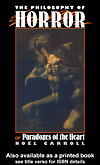by Noel Carroll — and I have no clue how to make his umlat. And, only took me this long to read it (it’s cited everywhere, is maybe the only of its kind) is because it was lodged in my head as being written by Noel Coward. Which never made sense. But, finally dug it up, peeled through it, and it’s solid. My favorite:
The majority of horror stories are, to a significant extent, representations of processes of discovery, as well as often occasions for hypothesis formation on the part of the audience, and, as such, these stories engage us in the drama of proof.
My boldface, yeah. But, for years now I’ve been casting around, trying to figure out why my novels tend to be shaped like they are. I always wanted to call them ‘epistemic’-something or another, but nothing would ever stick (and who am I to call my own stuff anything, yeah; this was all just in my head, though, if that helps). But it’s so often about one dude (or dudette) encountering something ‘off,’ then following that off-ness into layers of lies surrounding something awful they finally have to face. What that is, though, it’s Carroll’s “drama
of proof.” That’s exactly what and why I write, I think, and . . . horror. I used to always think I wrote it because I loved it, and of course I want to write what I like to read. Made sense. And’s maybe not wrong. But, too, as Carroll describes the narrative shapes and dynamics used to deliver horror– those are my shapes. Of course I’m in horror. Even my non-horror, it’s shaped like horror.
Anyway, I meant for this to be a somewhat-review of The Philosophy of Horror. Really, though, it’s all there in the title: this is a philosopher peeling through a kind of narratological analysis of the genre/mode of horror. So, expect the way-precise, nearly legal phrasing — I so dig it, myself — expect about ten-thousand “moreovers” (Carroll’s crutch word), and understand that, unlike Clover, say, he doesn’t seem embarrassed by what he likes. It’s refreshing. I mean, he acknowledges all the ways horror’s maligned, and hints some at how that kind of prejudice can be internalized, but he knows his horror as only a true fan could, and you can sense the excitement just under the argument. He’s giddy with it, he wants to let horror be what it is, but he’s too sophisticated in his thinking to default to any of those stupid arguments that would try to ‘elevate’ it from the gutter.
Nicely done, Carroll.
As for any holes or weakness I spotted in his arguments, the only crack I see is when he’s talking about how we can be ‘scared’ of that which we ‘know’ is fake — the “Paradox of Horror.” And he dismisses the two prevailing (in 1990, anyway, when I was getting out of high school . . .) theories, and finally settles on his own, of course. And it’s pretty compelling, and not just because he sets the others up as straw men, I don’t think. He gives them their due, and, later when he’s talking about some psychoanalytic angles, he gives them enough of their due that I want to read those books, now; they seem to make sense (but then I loved Peter Brooks’ Psychoanalysis and Storytelling fifteen years ago — made perfect sense as well).
Anyway, what I think Carroll’s missing with this Paradox of Horror is that we also have emotional responses to dreams, and nightmares. We wake mad, sad, scared, all that. Yes? What this says to me is that we have some kind of mental movie screen in our heads, one that’s usually got the outside world projected on it (or some representation of it — who knows if the ‘blue’ you’re seeing is my blue, all that, or, I mean, I might see the whole world as Kenneth does: muppets). But, in our sleep, with the outside world turned off, what’s on that screen is just as real. Fiction, I think, when the story mechanisms are working properly, they’re what’s projected on that screen. And the emotions we feel in response, they’re real.
But, yeah, how to explain why we return to horror time and again, if fear/terror/dread/disgust is what we feel, right? I dig Carroll’s push that it’s the key that opens the door to that sense of awe we as humans need, or are addicted to. Or want, anyway. It’s kind of HP Lovecraft’s argument (cosmic horror, all that), but it’s finer-tuned, and of course with Lovecraft, the whole time you’re reading it, you’re somewhat reading it as a justification, right? With Carroll, though, what it feels like is he’s just a fan, pure through, and he’s using his head to try to tease apart the magic of horror. And he’s doing this without killing it, which is always the danger with analysis and criticism. Everything he’s saying about horror, it makes perfect sense. And this from somebody who went in half-expecting to trash it, looking on each page for that eject button, so I could read some other stuff.
The Philosophy of Horror completely gripped me, though, and convinced me, and stole like ten of my days. I’d have paid twenty, though. And I’ll be reading it again, too.





